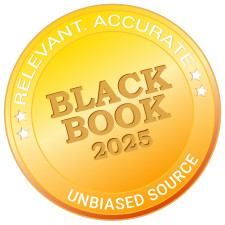
Onyx Leads the 2025 Healthcare Interoperability Market with OnyxOS Platform
TAMPA, Fla., December 17, 2024 (Newswire.com) - Black Book Research has identified Onyx as the highest-rated vendor in its 2025 survey on FHIR-based prior authorization interoperability solutions. The survey, which captured insights from 665 providers and 718 payers, highlights the importance of CMS-mandated HL7\u00ae FHIR\u00ae (Fast Healthcare Interoperability Resources) standards in modernizing healthcare data exchange.
The study underscores the essential role of FHIR-based APIs in optimizing prior authorization workflows, enabling organizations to improve operational efficiency, meet compliance requirements, and enhance patient outcomes. Under recent CMS mandates, payer organizations-including Medicare Advantage Plans, Medicaid Managed Care Organizations (MCOs), and Qualified Health Plans - are required to adopt FHIR standards to enhance data sharing and interoperability. These regulations aim to standardize, secure, and simplify the exchange of healthcare data across ecosystems.
"These CMS mandates represent a transformative advancement for the healthcare industry," said Doug Brown, Founder of Black Book Research. "FHIR standards provide a robust, technically sound framework for seamless system integration, improving the efficiency of prior authorization and claims workflows. By leveraging FHIR-based APIs, organizations achieve real-time, bidirectional data exchange, fostering provider collaboration while reducing administrative overhead. This shift supports the industry's broader transition to value-based care models."
Onyx: Top Performer in FHIR Interoperability
Onyx emerged as the leading vendor in the survey, achieving the highest ratings in prior authorization integration. Feedback from 1,383 participants recognized OnyxOS as a benchmark platform for implementing CMS-mandated FHIR standards, highlighting its technical excellence and user-centric design.
Built on Microsoft Azure, OnyxOS offers unparalleled scalability and robust data protection, ensuring the platform can handle increasing operational demands with reliability. Its advanced automation capabilities streamline complex workflows such as prior authorization and claims adjudication, minimizing delays and reducing administrative burdens for users. Additionally, OnyxOS enables bidirectional, real-time data sharing, providing transparency and aligning with CMS regulatory timelines. This functionality promotes efficient payer-provider communication, a critical component in meeting compliance requirements and advancing value-based care models.
Survey participants commended OnyxOS for its ease of integration with existing healthcare systems and its ability to meet compliance requirements while enhancing collaboration. With top satisfaction scores across 14 of 18 performance indicators, OnyxOS exemplifies technical excellence in the FHIR interoperability landscape.
While Onyx led the rankings, other vendors were also recognized for their capabilities in enabling FHIR-based interoperability:
Smile Digital Health
Specializes in scalable solutions that enhance payer-provider collaboration and ensure seamless, compliant data exchange. Its adaptable platforms support integration with diverse healthcare systems, helping organizations meet CMS and ONC interoperability mandates.
Redox
Simplifies healthcare integration through APIs that enable fully electronic prior authorization and streamline complex workflows. Redox focuses on reducing administrative burdens and facilitating secure, real-time data exchange across systems.
Infinx
Leverages AI-driven automation to optimize revenue cycle workflows, including prior authorization and claims processing. Its tools enhance payer-provider communication and improve efficiency in managing reimbursement and compliance.
Availity
Processes over 13 billion annual transactions as the nation's largest health information network. Availity provides real-time connectivity and data exchange, enabling organizations to improve administrative workflows and operational efficiency.
Rhapsody
Offers robust, scalable tools for data integration, supporting collaboration across payers and providers. Rhapsody's adaptable platform ensures compliance with interoperability standards while addressing the evolving needs of healthcare organizations.
Black Book Research presents collective insights from healthcare providers and payers gathered through its survey process, focusing on strategies for successfully adopting FHIR-based solutions. The key recommendations, ranked by the percentage of participants identifying their top two priorities, include:
95% - Partner with Proven Leaders
Work with vendors that have demonstrated expertise in compliance, scalability, and security. Proven leaders ensure seamless integration, end-to-end support, and reduced risks associated with implementation challenges.
92% - Ensure Regulatory Alignment
Select solutions that meet CMS mandates and ONC standards to maintain compliance, avoid penalties, and streamline workflows. Look for tools that support real-time data exchange and transparency in processes like prior authorization.
88% - Adopt Cloud-Native Solutions
Invest in scalable, secure, cloud-native platforms to support evolving operational and technical needs. Cloud-native solutions reduce infrastructure costs, improve flexibility, and ensure long-term adaptability.
81% - Leverage Advanced Automation
Automation tools can streamline prior authorization and claims adjudication, reducing administrative burdens and delays. Choose vendors focused on automating time-intensive processes to improve efficiency and accuracy.
"These findings highlight the collective expertise of providers and payers navigating FHIR adoption," said Doug Brown, Founder of Black Book Research. "To succeed with FHIR initiatives, organizations should prioritize experienced vendors, regulatory readiness, and scalable, automated solutions. By aligning vendor capabilities with organizational needs and focusing on proven systems, cloud-native platforms, and automation, they can ensure compliance, improve operational efficiency, and establish a strong foundation for long-term success in healthcare interoperability."
The report further underscores the transformative potential of FHIR-based solutions. By addressing regulatory compliance and improving operational efficiency, FHIR standards are driving the healthcare industry's shift to interconnected, value-based care ecosystems. Vendors offering cloud-native, future-ready platforms play a pivotal role in advancing real-time, secure data exchange between stakeholders.
About Black Book Research
Black Book Research is an independent market research and public opinion company specializing in healthcare IT and managed services. Since 2003, Black Book has provided comprehensive and unbiased evaluations of vendor performance, relying on crowdsourced insights from actual users. Committed to impartiality, Black Book does not accept fees for inclusion or maintain financial ties with vendors or advisory firms. Its research empowers healthcare organizations to navigate critical topics such as interoperability, regulatory compliance, and CMS-mandated FHIR standards. By delivering actionable data, Black Book enables healthcare stakeholders to make informed technology investments that drive improved patient care and operational efficiency.
Source: Black Book Research
Share:
